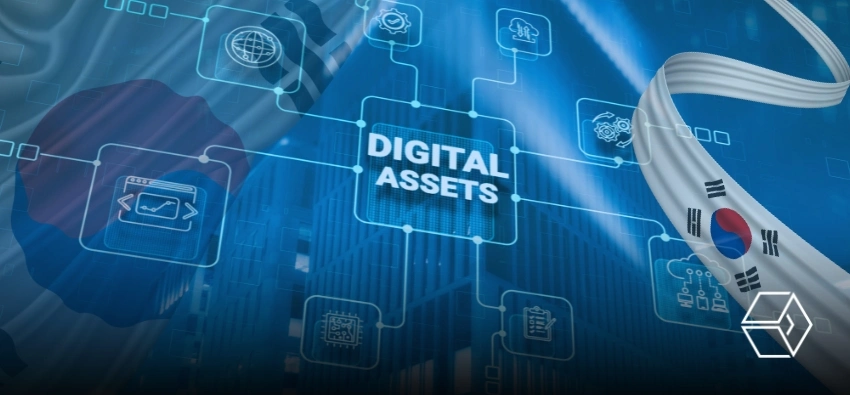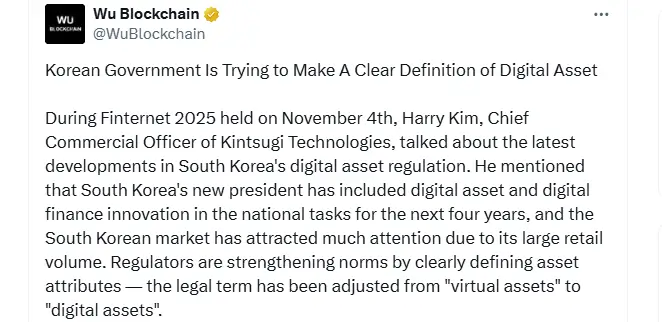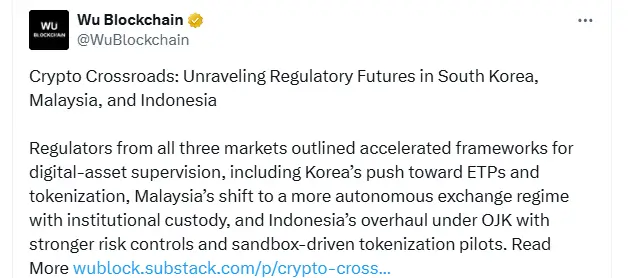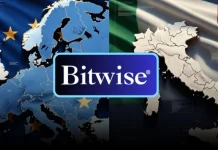
- Korea’s new digital-asset rules push Asia toward stronger coordinated regulation.
- Malaysia expands token listing autonomy and prepares broader institutional products.
- Indonesia raises custody and risk standards as crypto oversight shifts to OJK.
South Korea’s decision to tighten and clarify its digital-asset rulebook is now influencing regulators across Asia, prompting Malaysia and Indonesia to advance their own frameworks. Details emerged during the Finternet 2025 Asia Digital Finance Summit in Hong Kong, where senior officials outlined coordinated efforts that are reshaping the region’s digital-finance landscape.
Korea Redefines Its Rulebook and Races Toward ETP Adoption
South Korea is pushing through a significant overhaul that begins with a simple change in language: replacing the old term “virtual assets” with a legally defined category called “digital assets.” According to Harry Kim of Kintsugi Technologies, this shift signals a broader restructuring of how the state supervises crypto-related activity.
South Korea Crypto Overhaul Regarding Digital Asset (Source: X)
The new administration has made digital-finance innovation part of its national plan for the next four years. The updated framework will soon expand beyond exchanges to include custodians, stablecoin operators, research firms, and marketing outfits. Although the law is still under review, the expected rollout follows Korea’s usual process: about a year of examination followed by pilot testing, putting full implementation roughly one to two years away.
ETPs have also become an urgent topic in Seoul. Pressure mounted during Korea Blockchain Week as investors compared the country to Hong Kong, which already supports crypto exchange-traded products. Industry observers believe the Korean Stock Exchange could prepare an ETP launch within the next year, provided custody and legal structures are finalized.
On the other hand, taxation is the largest unresolved issue. Authorities are preparing rules that would impose taxes of roughly 20% to 25% on digital-asset activity, likely starting next year. Kim noted that businesses will not feel confident launching large tokenization projects, especially those tied to cultural assets like entertainment IP, until taxation is settled.
Malaysia Expands Exchange Autonomy and Builds an Institutional Market
Malaysia began regulating digital assets in 2019 and has spent the past several years observing how licensed platforms operate. After a recent review, regulators concluded that digital assets are now a regular part of investor portfolios, and demand for more advanced products is rising.
Wong Huei Ching from the Securities Commission Malaysia explained that new guidelines will arrive early next year. These changes will give registered exchanges the authority to list tokens based on their internal governance processes rather than waiting for direct regulatory approval.
With this freedom comes higher expectations. Exchanges will be required to strengthen wallet-security practices, raise capital standards, and adopt institutional-grade procedures. Malaysia’s broader ecosystem now includes 21 licensed players offering trading, derivatives, funds, and brokerage services.
Malaysia is also preparing for a wave of tokenized products. The securities regulator and Khazanah, the country’s sovereign wealth fund, are working on tokenized bonds set to debut next year. A regulatory sandbox supports pilots that cover issuance, payments, and settlement. The central bank is testing ringgit-backed stablecoins, with regulators emphasizing that real-world utility will determine how far the framework expands.
Indonesia Tightens Oversight as Crypto Shifts Under OJK
On the other hand, Indonesia is undergoing a structural change of its own. Crypto oversight is relocating from the Ministry of Trade to OJK, the Financial Services Authority. Under new financial-stability reforms, digital assets are now treated as financial assets rather than commodities.
Uli Agustina of OJK outlined a system designed to reduce risk and strengthen trust. All crypto transactions must pass through banks, and a national custodian holds at least 70% of user assets. A clearinghouse manages settlement across platforms, while a classification system helps categorize transactions more effectively.
Besides, Indonesia’s regulatory sandbox is testing several tokenization pilots, including systems for small-scale dairy farmers, real estate projects, gaming assets, and IP rights. These pilots aim to prove how digital tools can support financial inclusion and strengthen links between banks and the digital-asset sector.
The country’s plans for 2026 include tighter risk-governance rules for exchanges, the introduction of derivatives regulation under the same framework as spot trading, and improvements to financial-reporting standards. Authorities are also expanding anti-money-laundering cooperation to address cross-border cyber incidents and reduce regulatory loopholes.
Asia Moves in Synchrony as Regulation Becomes a Regional Priority
The message from the summit was clear: Asia’s regulators are no longer reacting to digital-asset markets. They are shaping them. Korea is accelerating legal reforms, Malaysia is giving exchanges more operational freedom, and Indonesia is building a tightly controlled architecture that aims to support long-term growth.
Asia Regulatory Move in Lockstep as Digital Finance Matures (Source: X)
These aligned moves point toward a regional shift, one in which digital-asset markets operate under clearer rules, stronger custody structures, and expanding tokenization programs, laying the groundwork for a more orderly phase of growth across Asia.





